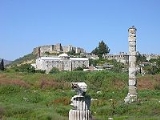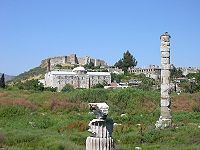
Apollonius of Ephesus
Encyclopedia
Apollonius of Ephesus was an anti-Montanist
Greek
ecclesiastical
writer, probably from Asia Minor
.
 He was thoroughly acquainted with the Christian history of Ephesus
He was thoroughly acquainted with the Christian history of Ephesus
and the doings of the Phrygia
n Montanists. The unknown author of Praedestinatus says he was a Bishop
of Ephesus. However, the lack of support from other Christian writers makes this testimony doubtful. He undertook the defense of the Church against Montanus, and followed in the footsteps of Zoticus of Comanus
, Julian of Apamaea, Sotas of Anchialus, and Apollinaris of Hierapolis
.
His work is cited by Eusebius
, and is praised by St. Jerome
, but has been lost, and not even its title is known. It most likely showed the falsity of the Montanist prophecies, recounted the unedifying lives of Montanus and his prophetesses. It also gave currency to the report of their suicide by hanging, and threw light on some of the adepts of the sect, including the apostate Themison
, and the pseudo-martyr Alexander.
Themison, having evaded martyrdom by means of money, posed as an innovator, addressing a letter to his partisans after the manner of the Apostles, and finally blasphemed Christ
and the Church
. Alexander, a notorious thief, publicly condemned at Ephesus, had himself adored as a god.
Based on Eusebius, it is known that Apollonius spoke in his work of Zoticus, who had tried to exorcise Maximilla, but had been prevented by Themison, and of the martyr-Bishop Thraseas, another adversary of Montanism. He likely gave the signal in it for the movement of opposition to Montanism which the reunion of the first synod
s developed.
At all events, he recalls the tradition according to which Jesus had advised the Apostles not to go far from Jerusalem during the twelve years immediately following His Ascension, a tradition known to Clement of Alexandria
from the apocrypha
l Praedicatio Petri. Moreover, he recounts the restoration to life of a dead man at Ephesus by the Apostle St. John
, whose Apocalypse he knew and quotes.
He takes rank among the opponents of Montanism with the "Anonymous" of Eusebius, with Miltiades and with Apollinaris. Eusebius says his work constituted "an abundant and excellent refutation of Montanism". St. Jerome qualified it as "a lengthy and remarkable volume". It did not therefore pass unnoticed, and roused some feeling among the Montanists since Tertullian felt it necessary to reply to it.
After his six books peri ekstaseos, in which he apologized for the ecstasies into which the Montanist prophetesses fell before prophesying, Tertullian composed a seventh especially to refute Apollonius; he wrote it also in Greek for the use of the Asiatic
Montanists.
Montanism
Montanism was an early Christian movement of the late 2nd century, later referred to by the name of its founder, Montanus, but originally known by its adherents as the New Prophecy...
Greek
Greeks
The Greeks, also known as the Hellenes , are a nation and ethnic group native to Greece, Cyprus and neighboring regions. They also form a significant diaspora, with Greek communities established around the world....
ecclesiastical
Ecclesiology
Today, ecclesiology usually refers to the theological study of the Christian church. However when the word was coined in the late 1830s, it was defined as the science of the building and decoration of churches and it is still, though rarely, used in this sense.In its theological sense, ecclesiology...
writer, probably from Asia Minor
Anatolia
Anatolia is a geographic and historical term denoting the westernmost protrusion of Asia, comprising the majority of the Republic of Turkey...
.

Ephesus
Ephesus was an ancient Greek city, and later a major Roman city, on the west coast of Asia Minor, near present-day Selçuk, Izmir Province, Turkey. It was one of the twelve cities of the Ionian League during the Classical Greek era...
and the doings of the Phrygia
Phrygia
In antiquity, Phrygia was a kingdom in the west central part of Anatolia, in what is now modern-day Turkey. The Phrygians initially lived in the southern Balkans; according to Herodotus, under the name of Bryges , changing it to Phruges after their final migration to Anatolia, via the...
n Montanists. The unknown author of Praedestinatus says he was a Bishop
Bishop
A bishop is an ordained or consecrated member of the Christian clergy who is generally entrusted with a position of authority and oversight. Within the Catholic Church, Eastern Orthodox, Oriental Orthodox Churches, in the Assyrian Church of the East, in the Independent Catholic Churches, and in the...
of Ephesus. However, the lack of support from other Christian writers makes this testimony doubtful. He undertook the defense of the Church against Montanus, and followed in the footsteps of Zoticus of Comanus
Comana, Cappadocia
Comana was a city of Cappadocia and later Cataonia . The Hittite toponym Kummanni is considered likely to refer to Comana, but the identification is not considered proven. Its ruins are at the modern Turkish village of Şar, Tufanbeyli district, Adana Province.-History:According to ancient...
, Julian of Apamaea, Sotas of Anchialus, and Apollinaris of Hierapolis
Apollinaris Claudius
Saint Apollinaris Claudius, otherwise Apollinaris of Hierapolis or Apollinaris the Apologist, was a Christian leader and writer of the 2nd century.-Life:...
.
His work is cited by Eusebius
Eusebius of Caesarea
Eusebius of Caesarea also called Eusebius Pamphili, was a Roman historian, exegete and Christian polemicist. He became the Bishop of Caesarea in Palestine about the year 314. Together with Pamphilus, he was a scholar of the Biblical canon...
, and is praised by St. Jerome
Jerome
Saint Jerome was a Roman Christian priest, confessor, theologian and historian, and who became a Doctor of the Church. He was the son of Eusebius, of the city of Stridon, which was on the border of Dalmatia and Pannonia...
, but has been lost, and not even its title is known. It most likely showed the falsity of the Montanist prophecies, recounted the unedifying lives of Montanus and his prophetesses. It also gave currency to the report of their suicide by hanging, and threw light on some of the adepts of the sect, including the apostate Themison
Themison of Eretria
Themison was a tyrant of Eretria who in 366 BC assisted the exiles of Oropus in recovering possession of their native city...
, and the pseudo-martyr Alexander.
Themison, having evaded martyrdom by means of money, posed as an innovator, addressing a letter to his partisans after the manner of the Apostles, and finally blasphemed Christ
Jesus
Jesus of Nazareth , commonly referred to as Jesus Christ or simply as Jesus or Christ, is the central figure of Christianity...
and the Church
Roman Catholic Church
The Catholic Church, also known as the Roman Catholic Church, is the world's largest Christian church, with over a billion members. Led by the Pope, it defines its mission as spreading the gospel of Jesus Christ, administering the sacraments and exercising charity...
. Alexander, a notorious thief, publicly condemned at Ephesus, had himself adored as a god.
Based on Eusebius, it is known that Apollonius spoke in his work of Zoticus, who had tried to exorcise Maximilla, but had been prevented by Themison, and of the martyr-Bishop Thraseas, another adversary of Montanism. He likely gave the signal in it for the movement of opposition to Montanism which the reunion of the first synod
Synod
A synod historically is a council of a church, usually convened to decide an issue of doctrine, administration or application. In modern usage, the word often refers to the governing body of a particular church, whether its members are meeting or not...
s developed.
At all events, he recalls the tradition according to which Jesus had advised the Apostles not to go far from Jerusalem during the twelve years immediately following His Ascension, a tradition known to Clement of Alexandria
Clement of Alexandria
Titus Flavius Clemens , known as Clement of Alexandria , was a Christian theologian and the head of the noted Catechetical School of Alexandria. Clement is best remembered as the teacher of Origen...
from the apocrypha
Apocrypha
The term apocrypha is used with various meanings, including "hidden", "esoteric", "spurious", "of questionable authenticity", ancient Chinese "revealed texts and objects" and "Christian texts that are not canonical"....
l Praedicatio Petri. Moreover, he recounts the restoration to life of a dead man at Ephesus by the Apostle St. John
John the Apostle
John the Apostle, John the Apostle, John the Apostle, (Aramaic Yoħanna, (c. 6 - c. 100) was one of the Twelve Apostles of Jesus. He was the son of Zebedee and Salome, and brother of James, another of the Twelve Apostles...
, whose Apocalypse he knew and quotes.
He takes rank among the opponents of Montanism with the "Anonymous" of Eusebius, with Miltiades and with Apollinaris. Eusebius says his work constituted "an abundant and excellent refutation of Montanism". St. Jerome qualified it as "a lengthy and remarkable volume". It did not therefore pass unnoticed, and roused some feeling among the Montanists since Tertullian felt it necessary to reply to it.
After his six books peri ekstaseos, in which he apologized for the ecstasies into which the Montanist prophetesses fell before prophesying, Tertullian composed a seventh especially to refute Apollonius; he wrote it also in Greek for the use of the Asiatic
Asian people
Asian people or Asiatic people is a term with multiple meanings that refers to people who descend from a portion of Asia's population.- Central Asia :...
Montanists.
Source
- Apollonius of Ephesus at Catholic Encyclopedia

